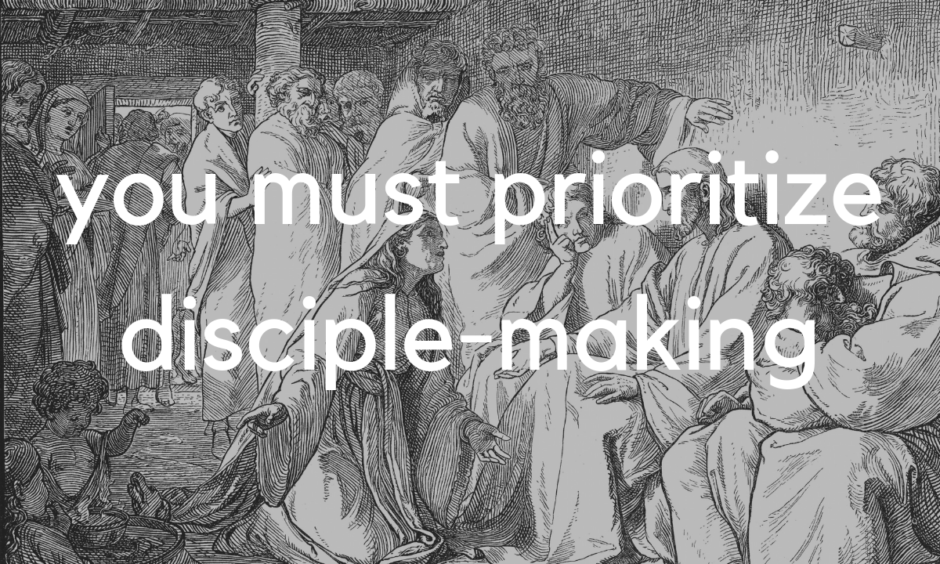The article below is an excerpt from one of the resources that I get the honor of working through with other young adult and college ministry leaders who are partnered with elementum.
Want to be more effective at making disciples among 18-30 year olds? Want your church to do better at engaging millenials, gen Z, and other emerging adults? Contact elementum or leave a comment here and we’ll get in touch!
Why is disciple-making central?
So, why do we at elementum believe disciple-making must be central to every Christian ministry?
Jesus commands it
Firstly, as we’ve already seen, Jesus commands it. And, as Jesus says in one of his parables, hearing his words and not obeying them is like building a house on sand. It’s not going to last. Hearing his words and obeying them, however, is like building on a solid rock that will withstand all storms. Jesus commands it, and we want our ministries to be built to last.
Jesus demonstrates it
Not only does Jesus command disciple-making, he also demonstrates it. If his direct word wasn’t enough, we can learn equally as much from looking at Jesus’ model of ministry. His primary mode of ministry was working with his twelve disciples and equipping them to do much of what he did. Even most of the ministry that Jesus does to the large crowds that begin to gather seems to be more of a practice space for his disciples to experience how to minister than it was to gain a large following.
The Apostle Paul also demonstrates this kind of disciple-making heart, intentionally shaping his life as he travels around the near east, engaging a group of people and welcoming them into his life so they can learn to know and imitate the truth. Note Paul’s commandment to Timothy to entrust to faithful men who can teach others the core truths of the Gospel (2 Timothy 2:2). Disciple-making is the model of ministry demonstrated by the examples set before us in the New Testament.
It’s effective
It’s easy to hear a great sermon and walk away unchanged with just a little more information in your head. Though God absolutely promises that His word will not return void and that there is power in preaching, disciple-making is crucial to help people put the truth they’ve heard into practice in the realm of everyday life.
There’s incredible power in having someone walk alongside you, demonstrating and encouraging you in walking out your faith. This is particularly true for young adults who are increasingly disconnected from the church as an institution but eager for authentic relationships. We’ve found that disciple-making is one of the most effective means of drawing people to and growing people in Jesus.
It’s reproducible
Not everyone can preach a sermon or lead worship or plan a big event, but every believer has the Holy Spirit and can give their life to listening to the Father, doing what he says, and inviting others along. Disciple-making is reproducible because there’s no overhead, no need for a planning committee, and is something that can be done in and through your day-to-day life as a follower of Jesus.
It’s exponential
With that reproducibility comes the power of exponential growth. While disciple-making often starts slower than launching an amazing weekly worship service for young adults and college students, its impact and growth trajectory are radically different.
Studies and surveys are showing a consistent trend of culture and individuals away from the Christian faith. This, combined with the fact that humanity is growing at an exponential rate, means that simply adding more people to our events isn’t an effective means of making a meaningful impact on our cities and neighborhoods. The only way we’ll do that is with methods that can handle exponential growth, and disciple-making is exactly that.
Disciple-making must be at the heart of every ministry we lead if we are to follow Jesus. How exactly that looks may vary widely based on our context, the uniqueness of our mission, and other factors. Regardless of what exactly that disciple-making looks like, we must structure for it, teach toward it, and (most importantly) practice it as leaders. We believe deeply that your primary task as a leader isn’t preaching, planning events, serving the community, or anything else. It is to, in the overflow of your loving relationship with Jesus, invest deeply in a few people, teaching them to obey all that Jesus commanded and equipping them to do the same. That is disciple-making.





No Comments